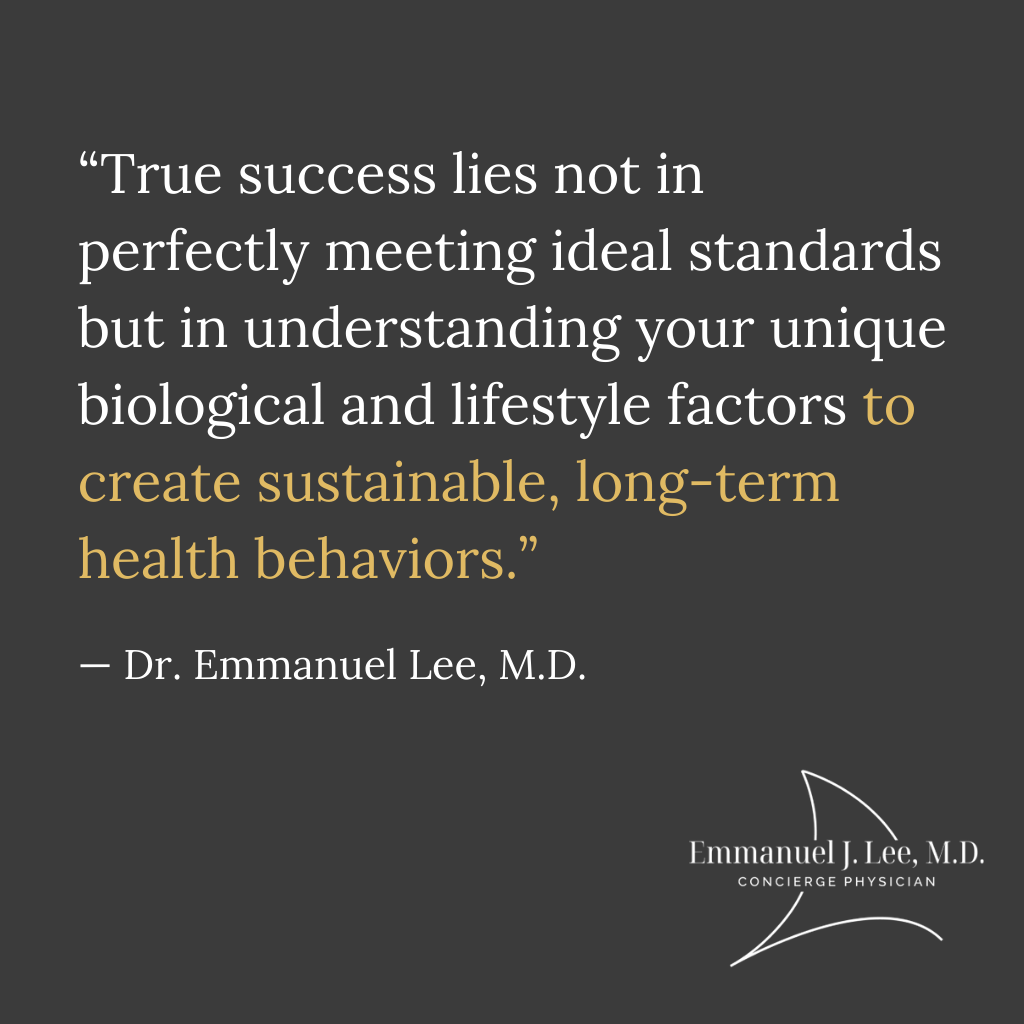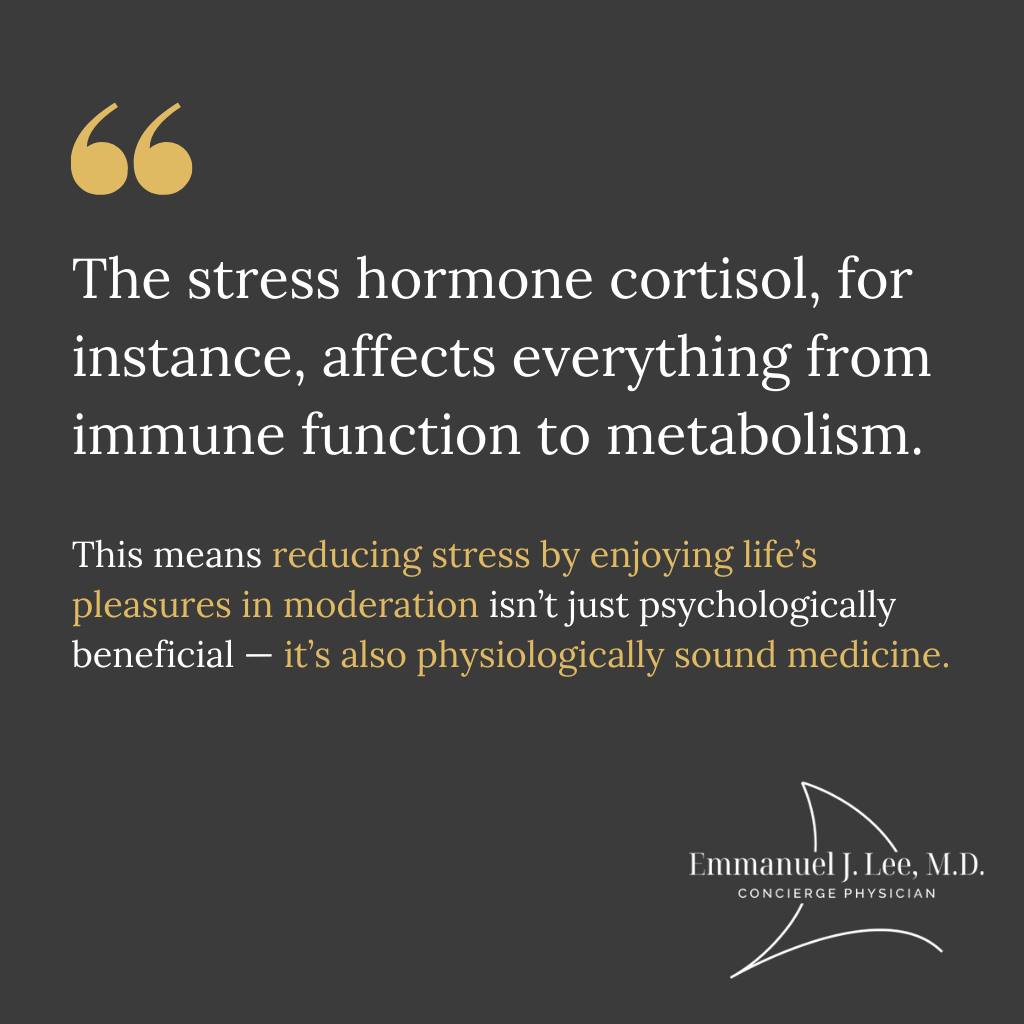Recently, I ran across a debate in social media wellness circles about the validity of moderation as a health strategy. Some voices were advocating for rigid approaches to health and lifestyle choices, arguing that moderation can be a slippery slope to excess.
While I understand the perspectives of these influencers, be careful before you jump on this bandwagon. Their opinions often lack a foundation in clinical experience and instead are based on anecdotal evidence or biased research. Additionally, they often represent extreme positions aimed at gaining attention or promoting products for personal financial gain.
I’ve worked with thousands of patients. And over the years, I’ve noticed something interesting: we’re all striving to be perfectly healthy, but sometimes that focus on “perfect” can actually be detrimental to our overall health. It’s a strange paradox.
In my experience, achieving and maintaining perfection is simply not realistic. Instead, I believe moderation is key. Embracing moderation acknowledges that you are human, with natural behavioral fluctuations, and that self-compassion is essential throughout your journey.
The Clinical Reality of Health Behavior Change
Throughout my years of practicing medicine, I’ve had the privilege of guiding patients through various health journeys. One consistent lesson stands out: sustainable change rarely follows an absolute or linear path. In fact, small, consistent changes are often more closely associated with better long-term health outcomes.
True success lies not in perfectly meeting ideal standards, but in understanding your unique biological and lifestyle factors to create sustainable, long-term health behaviors.

The Science Behind Sustainable Health Behaviors
While current medical guidelines recommend specific health markers — 150 minutes of moderate exercise weekly, 7–8 hours of sleep nightly, and a predominantly plant-based diet supplemented with omega-3-rich foods — the implementation of these guidelines must account for individual circumstances.
I’ve found that if I can achieve one or two of these goals, I feel better, but I can say, without shame, that I don’t think I’ve ever achieved all three in any given week. And I know it’s not stressful — there’s always next week to eat more broccoli.
Understanding Health in Context
Social media platforms often portray health and wellness in an unrealistic way, showcasing extreme approaches or oversimplified solutions. This creates what we in healthcare call “health behavior dissonance” — the gap between idealized health practices and sustainable real-world behaviors.
From a medical perspective, this dissonance can trigger stress responses that often negate the benefits of otherwise healthy choices. When I discuss this with patients, I emphasize that health optimization isn’t about perfection. It’s about finding sustainable patterns that work within the context of their life.
Consider the following evidence-based framework for implementing moderate, sustainable health:
- Establish baseline health metrics through comprehensive testing and evaluation
- Identify personally sustainable health behaviors that align with your lifestyle
- Monitor both objective health markers and subjective well-being
- Adjust strategies based on ongoing assessment and real-world results
The Integration of Physical and Emotional Wellness
It’s also important to remember the direct link between emotional well-being and physical health. Our brain and body constantly communicate, influencing everything from immune response to hormone levels.
The stress hormone cortisol, for instance, affects everything from immune function to metabolism. This means that reducing stress by enjoying life’s pleasures in moderation isn’t just psychologically beneficial — it’s also physiologically sound medicine. Positive emotions can support overall health by reducing stress hormones and improving mood-related neurotransmitter activity.
My father, a physician who was meticulous about his health, had a particular fondness for pre-packaged, overly processed wafer cookies. These cookies are not healthy (in fact, they’re very unhealthy), but seeing them in Austin stores reminds me of him. Occasionally, I purchase them and enjoy them in moderation to enjoy the connection to, and memory of, my dad.
While Quadratini cookies may not align with strict nutritional guidelines, their value to me goes beyond their ingredients.

Informed Balance — Finding Your Personal Health Sweet Spot
In modern medicine, we understand that individual physiological variables influence health outcomes.
We now know that factors like genetic predisposition, gut microbiome composition, and circadian rhythms determine how our bodies respond to different health interventions. We must also consider personal factors like stress, diet and nutrition, physical activity, and personal health practices.
This knowledge reinforces the importance of finding your “sweet spot” in health behaviors. It’s not about adhering to arbitrary standards of perfection, but rather about understanding your unique physiology and circumstances to create sustainable, health-promoting patterns.
At my practice, I encourage members to view health as a long-term journey rather than a destination. Success isn’t measured by perfect adherence to ideal standards but by consistent progress toward better health outcomes. This approach, grounded in both medical science and practical experience, allows for life’s natural ebb and flow and steady progress toward health goals.
For those interested in learning more about developing a personalized, sustainable approach to health, I welcome you to reach out to our practice. Let’s work together to create a health strategy that’s both effective and sustainable for your unique situation.






